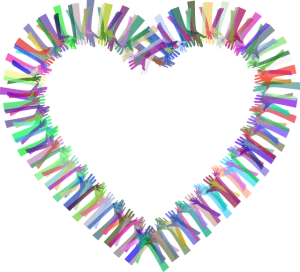
‘When Jesus saw the crowds, he had compassion on them’ Mt.9:36 CEB, (TM says ‘his heart broke’, GN says ‘his heart was filled with pity’)
The image of Jesus as the Compassionate One is scorched on the pages of the Four Gospels; when looking on the crowd, or Jerusalem, or dealing with the sick, the lame, the alienated, those who nailed him to the cross, the jeering onlookers, and as he hung there – his grief-stricken mother – the image is repeated again and again.
When we are born the seed of compassion is born within us. We are born to connect, first with our mother, then with others. It is the core of our humanity. Scientific investigation places it squarely as ‘basic to human nature’; we are hard-wired to connect and care. It is the common ground where all religions ‘come together’. It is a practice greatly needed today in the world of fauna and flora, animals and people and by world leaders. We admire it when we ‘see’ it in individuals or organizations – why then do we often find it so difficult? Archbishop Tutu said ‘it is something we have to learn’, but what is it?
Amazon Books carry hundreds of titles on the subject. The dictionary defines compassion as ‘a feeling of distress and pity for the suffering or misfortune of another, often including the desire to alleviate it‘. The psychologist Paul Gilbert writes ‘Compassion is one of the most difficult and courageous of all our motivations, but it does the most healing’. We refrain from it because we are afraid of being taken advantage of, or we have enough problems of our own, or we think the other will take us for granted and become dependent on us. Our pride and defensiveness can inhibit us. C. S Lewis argued that we confuse it with sentimentality. Our Western culture conditions us to look after ourselves. Compassion takes us out of ourselves to identify with the sufferer.
If Fr. Rohr is correct when he identifies compassion as our ‘True Self’, then maybe we refrain when our reaction is being ruled by our ‘False Self’. Recall for a moment your own reaction when accosted at traffic lights, or when you see the unemployed sitting on the verge, or an animal being mistreated, or someone desperately ill, or sorrowful. It is much more than merely thinking, or feeling. The ’best’ within you wants to connect, to help, to relieve; the ‘weakness’ in you whispers ‘turn away’ there’s a limit to what you can do. To quote Archbishop Tutu again ‘It is through weakness and vulnerability that we learn empathy and compassion and discover our soul’.
How do we learn to cultivate the ‘seed’ that was buried in us at birth? By nurturing it, giving it a try we discover that paradoxically it brings benefits both to the receiver and the giver – and in so doing we tap into its transforming power. The Dalai Lama is revered as ‘the voice’ of compassion, Mother Theresa of Calcutta as ‘the epitome’ of compassion, Mandela saw his guard as a ‘fellow human being’, Etty Hillesum, who perished in Auschwitz, wrote ’there is something of God in every human being’ including the Gestapo member. They stand high among us as the ideal; we have to move from the high ideal, which we admire but feel is beyond us, to embrace an energy we can tap into. Organizations such as Animal Rescue, Red Cross and Gift of the Givers are community expressions of that. We see it in action in the ‘helpers’ who step in, endangering themselves, when earthquakes and floods occur.
We can take steps to cultivate compassion by training our mind to be kind and by monitoring our gaze; am I seeing the other correctly? Can I see them not as pitiable, or a threat, or disgusting, or unlikeable, but, being human – basically good natured stamped with God’s image in them no matter their appearance? The ‘seed’ in us is also hidden somewhere in them. Even beggars share with one another. We can do it by looking for the positive instead of the negative aspects in those we see or meet. We can do it by remembering how we felt when someone came to our help spontaneously, spoke or wrote a word of encouragement, gave us a hug, put a generous gift in our hand, or touched us as a gesture of kindness. We can remember the warm feeling of acceptance, gratitude and understanding that welled up in our heart and mind. The other person may have the same reaction, but by withholding our compassion we deny them that possibility. We can spare a few moments each day recalling the special moments we have had and the impression made on us.
Compassion, even the smallest act, carries a powerful impact for good, for making a difference, for creating joy and meaning, for healing and restoring, reassuring and reconciling. It is fundamental to our basic nature as human beings. It creates connectedness. It recognizes our interdependence, our need of one another and oneness. St. Peter writes, ‘Be agreeable, be sympathetic, be loving, be compassionate, be humble…You’ll be a blessing and also get a blessing’ 1 Pt.3:8 TM
